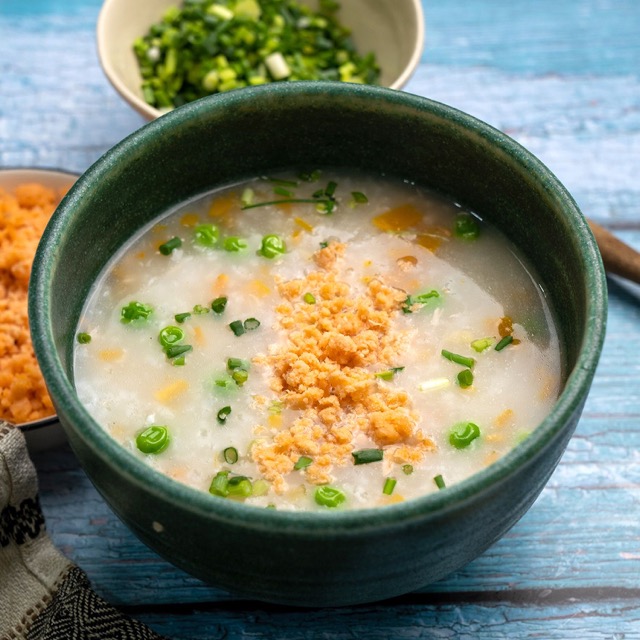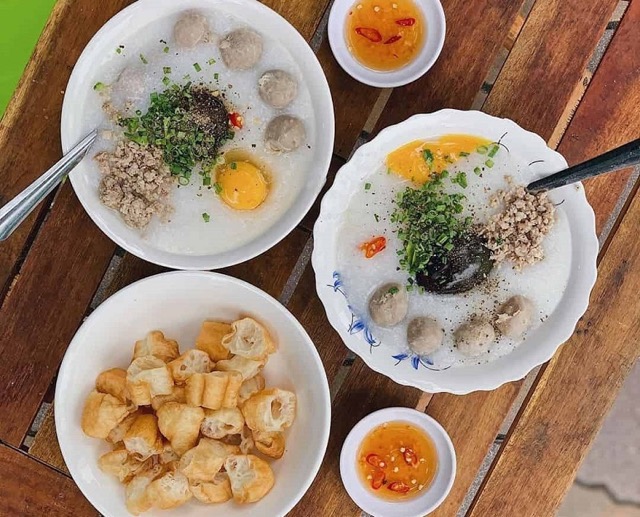Vietnamese porridge, a culinary gem in Vietnam, holds a special place in the hearts of both locals and visitors. This article explores its rich flavors, regional variations, and cultural significance.
See more: Authentic Vietnamese Cuisine – Exploring Vietnam’s Flavors
Contents
The Significance of Porridge in Vietnam
In Vietnam, porridge, known as “cháo,” holds cultural and culinary importance. It symbolizes warmth, simplicity, and a deep-rooted appreciation for traditional flavors.

Porridge is a staple in Vietnamese households, often enjoyed for breakfast during the cooler months. It serves as a comforting and easily digestible start to the day. Additionally, it is commonly consumed when individuals are feeling unwell due to its gentle nature on the stomach.
Vietnamese porridge is diverse, with each region offering its own unique variations:
- Chicken Porridge (Cháo Gà): Featuring rice and tender chicken, often seasoned with ginger for a refreshing taste.
- Beef Porridge (Cháo Bò): Thinly sliced beef enhances the savory aspect, complemented by fresh herbs and sauces.
- Fish Porridge (Cháo Cá): Coastal regions favor fish, typically catfish or basa, combined with zesty spices and herbs.
- Offal Porridge (Cháo Lòng): Combining various organ meats for a bold flavor, commonly found in street food.
- Blood Cockle Porridge (Cháo Hàu): Distinct with the taste of blood cockles, often enhanced with lime and chili.
- Pork Rib Porridge (Cháo Sườn): Pork ribs enrich the porridge, often accompanied by pickled mustard greens.

Century Eggs Are Familiar Topping For Pork Rib Porridge – Source: Internet
Where to Enjoy Authentic Vietnamese Porridge
A warm bowl of rice porridge, simmered to perfection and infused with a range of ingredients, is a culinary delight you don’t want to miss during your visit to Vietnam.
- Porridge Burden: One of the quintessential features of Vietnamese porridge is the ability to adapt to various tastes and preferences. Whether you’re a fan of seafood, chicken, or vegetarian options, you’ll find a diverse array of choices.
- Porridge Stalls: You can often find Vietnamese porridge at dedicated porridge stores or stalls throughout Vietnam. These establishments specialize in serving various types of porridge, including chicken, beef, fish, and more. It’s a convenient and authentic way to enjoy this traditional dish while exploring the local culture. Don’t hesitate to ask locals for their favorite porridge places to discover hidden gems and savor the best flavors.
Vietnamese omelet will satisfy your appetite.
Homemade Delight: Vietnamese Porridge Recipe
Cháo Gà (Vietnamese Chicken Porridge)
Ingredients
- 1 cup of rice
- 4 cups of chicken broth (homemade or store-bought)
- 1 chicken breast (or 2 chicken thighs), boneless and skinless
- 1 small piece of ginger (about 2 inches long)
- 2 cloves of garlic (minced)
- Salt and pepper to taste
- Green onions, cilantro, and fried shallots for garnish
- Lime wedges and fish sauce for serving (optional)
Instructions
- Rinse the Rice: Rinse the rice under cold water until the water runs clear.
- Cook the Rice: In a large pot, combine the rice and chicken broth. Bring to a boil, then reduce the heat to a simmer. Stir occasionally to prevent sticking. Let it simmer for about 25-30 minutes, or until the rice is soft and the mixture thickens.
- Prepare the Chicken: While the rice is cooking, cut the chicken breast (or thighs) into thin strips.
- Make the Aromatics: Slice the ginger into thin strips and mince the garlic.
- Sauté Aromatics: In a separate pan, heat a tablespoon of cooking oil over medium heat. Sauté the ginger and garlic until fragrant.
- Add Chicken: Add the chicken strips to the sautéed ginger and garlic. Cook until the chicken is no longer pink, about 5-7 minutes.
- Combine Ingredients: Once the rice is soft and the mixture thickens, add the sautéed chicken and aromatics. Continue to simmer for an additional 10 minutes.
- Season and Garnish: Season the porridge with salt and pepper to taste. Garnish with green onions, cilantro, and fried shallots.
- Serve: Serve your Cháo Gà hot. You can also offer pepper and fish sauce on the side for extra flavor.

Cháo Cá (Vietnamese Fish Porridge)
Ingredients
- 1 cup of rice
- 4 cups of fish or seafood broth (homemade or store-bought)
- 1/2 lb of white fish fillets (such as cod or tilapia), cut into small pieces
- 1 small piece of ginger (about 2 inches long)
- 2 cloves of garlic (minced)
- Salt and pepper to taste
- Fresh herbs (mint, cilantro, basil)
- Sliced green onions and fried shallots for garnish
- Lime wedges and fish sauce for serving (optional)
Instructions
- Rinse the Rice: Rinse the rice under cold water until the water runs clear.
- Cook the Rice: In a large pot, combine the rice and fish broth. Bring to a boil, then reduce the heat to a simmer. Stir occasionally to prevent sticking. Let it simmer for about 25-30 minutes, or until the rice is soft and the mixture thickens.
- Prepare the Fish: Cut the fish fillets into small pieces.
- Make the Aromatics: Slice the ginger into thin strips and mince the garlic.
- Sauté Aromatics: In a separate pan, heat a tablespoon of cooking oil over medium heat. Sauté the ginger and garlic until fragrant.
- Add Fish: Add the fish pieces to the sautéed ginger and garlic. Cook until the fish is opaque and flakes easily, about 5-7 minutes.
- Combine Ingredients: Once the rice is soft and the mixture thickens, add the sautéed fish and aromatics. Continue to simmer for an additional 10 minutes.
- Season and Garnish: Season the porridge with salt and pepper to taste. Garnish with fresh herbs, sliced green onions, and fried shallots.
- Serve: Serve your Cháo Cá hot. You can also offer lime wedges and fish sauce on the side for extra flavor.

Nutritional Value of Vietnamese Porridge
Vietnamese porridge is not only a delicious comfort food but also offers several nutritional benefits.
Vietnam Fried Noodles is a must-try dish in yoủ journey.
Nutritional Content
- Rice: The primary ingredient in Vietnamese porridge is rice, which is a good source of carbohydrates. It provides energy and is a staple in many Asian diets.
- Protein: Depending on the variation of porridge, protein content can vary. Chicken and seafood porridge, such as “Cháo Gà” and “Cháo Cá,” offer a significant protein boost, making them a good source of lean protein. However, vegetarian versions like “cháo chay” and “cháo nấm” provide protein through plant-based ingredients.
- The calorie content in 100g of Vietnamese porridge:
- White Porridge: 100g contains 251 kcal.
- Meat Porridge: 100g contains 320.6 kcal.
- Chicken Porridge: 100g contains 294.6 kcal.
- Fish Porridge: 100g contains 316 kcal.
- Rib Porridge: 100g contains 325.3 kcal.
- Oyster Porridge: 100g contains 250 kcal.
These calorie values are approximate and can vary depending on the specific ingredients and cooking methods used.
- Vitamins and Minerals: Vietnamese porridge is rich in vitamins and minerals, especially when it’s loaded with herbs and vegetables. Ingredients like ginger and garlic contribute to essential nutrients.
- Low in Fat: Traditional Vietnamese porridge is relatively low in fat, making it a healthy option, particularly if you choose lean protein sources.
Potential Health Benefits
- Digestive Health: The easily digestible nature of porridge can make it a soothing choice for individuals with digestive issues. The rice and ginger in the porridge can help calm the stomach.
- Hydration: Porridge’s high water content can help keep you hydrated, especially during illness.
- Immune Support: Ginger, a common ingredient in Vietnamese porridge, is known for its potential immune-boosting and anti-inflammatory properties.
- Protein for Muscle Health: Porridge made with chicken or fish provides essential protein, promoting muscle health and repair.
Vietnamese Udon is a interesting noodles soup for food lovers.
Dietary Considerations
For Travelers with Dietary Restrictions:
- Vegetarian Options: “Cháo chay” (vegetarian porridge) and “cháo nấm” (mushroom porridge) are excellent choices for vegetarians. These variations often feature tofu, mushrooms, and a variety of plant-based ingredients that provide protein and flavor.
- Gluten-Free: Vietnamese porridge, made with rice, is naturally gluten-free, which is ideal for individuals with gluten sensitivities or celiac disease.
- Allergies: Pay attention to specific ingredients, especially if you have allergies. Seafood allergies, for example, might require you to avoid certain porridge types.
Conclusion
In conclusion, Vietnamese porridge, or “cháo,” is a versatile dish enjoyed for its comfort and flavor. Its nutritional value and dietary flexibility make it a popular choice. Whether you seek hearty meat options or vegetarian alternatives, there’s a porridge for every palate.


Related Posts
Vietnam Motorbike Adventures: The Ultimate Guide
With its breathtaking landscapes, rich cultural heritage, and vibrant local experiences, Vietnam offers an unforgettable adventure for motorbike enthusiasts. Discover hidden gems, meet friendly locals, and create lasting memories as you explore diverse terrains and immerse yourself in the heart of Vietnam. Contents1 Why Choose a Motorbike Adventure in Vietnam?1.1 Freedom and Flexibility1.2 Scenic Routes1.3 […]
Experience the Living Conditions in Cu Chi Tunnels: Unbelievable!
Cu Chi Tunnels served as the living quarters for soldiers and civilians during Vietnam’s resistance against France and America. Today, this remarkable site stands as a symbol of perseverance, determination, and resilience during one of the most challenging periods in Vietnamese history. Discover the living conditions in Cu Chi Tunnels with Joy Journeys in the […]
Vietnam Fish Cake: A Culinary Delight
Vietnam fish cake, known for its delicious and diverse flavors, is a favorite among tourists looking to explore authentic Vietnamese cuisine. From the crispy, golden-brown texture of fried fish cakes to the fragrant, herb-infused variations found in regional specialties, these savory delights offer a true taste of Vietnam. In this article, we will take you […]